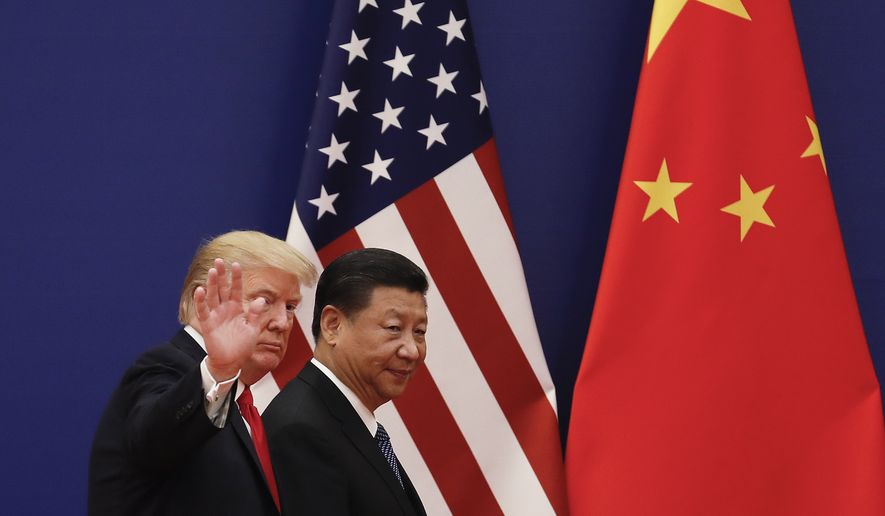The Trump administration Tuesday rolled out a list of proposed Chinese high-tech imports to hit with new tariffs, advancing get-tough measures that have raised alarms about a trade war.
The list named 1,300 separate products with a total value of roughly $50 billion. President Trump ordered the tariffs to combat China’s unfair trade practices and theft of intellectual property.
The long list included industrial and medical chemical compounds, pharmaceuticals including birth control hormones, tires, plastic containers and other plastics, stainless steel, aluminum products and electric circuit components.
Beijing threatened to retaliate when Mr. Trump announced the pending tariffs last month. China already reposed with a list of more than 120 U.S. items worth about $3 billion to hit with an import tax in response to the Trump administration imposing a tariff on steel and aluminum.
The tariffs follows through on Mr. Trump’s campaign promise to crack down on Chinese trade abuses and address the huge U.S. trade deficit.
Mr. Trump insisted he wasn’t starting the trade war.
SEE ALSO: Donald Trump insists there is no trade war with China
“We are not in a trade war with China, that war was lost many years ago by the foolish, or incompetent, people who represented the U.S. Now we have a Trade Deficit of $500 Billion a year, with Intellectual Property Theft of another $300 Billion. We cannot let this continue!” he tweeted Wednesday.
The list of tariffs got a thumbs up from frequent Trump critic Sen. Lindsey Graham.
“Nothing will ever change when it comes to China’s business practices until somebody starts pushing back,” said the South Carolina Republican. “It is not too much to ask for China to stop stealing intellectual property and open up their markets that are closed due to heavy-handed Chinese government barriers to foreign business enterprises.”
American businesses are skeptical.
“Retailers fully support holding our trading partners accountable when there is a proven case of intellectual property theft, but we remain concerned that many of these proposed tariffs will punish American consumers,” said Hun Quach, vice president of international trade for Retail Industry Leaders Association. “Tariffs on everyday consumer products will hit American wallets, not Chinese technology violators, and the presumption that any of these targeted products could be reasonably sourced elsewhere ignores the complexity of modern global value chains.”
Jay Timmons, president and CEO of the National Association of Manufacturers, said China’s abusive trade practices and theft of intellectual property pose a clear threats to American manufacturers.
“Tariffs are one proposed response, but they are likely to create new challenges in the form of significant added costs for manufacturers and American consumers. In addition to these challenges, tariffs also run the risk of provoking China to take further destructive actions against American manufacturing workers,” he said.
He called for using tariffs to force an agreement on “fair, binding and enforceable rules-based trade agreement with China that requires them to end their unfair trade practices once and for all.”
We are not in a trade war with China, that war was lost many years ago by the foolish, or incompetent, people who represented the U.S. Now we have a Trade Deficit of $500 Billion a year, with Intellectual Property Theft of another $300 Billion. We cannot let this continue!
— Donald J. Trump (@realDonaldTrump) April 4, 2018
• S.A. Miller can be reached at smiller@washingtontimes.com.




Please read our comment policy before commenting.